Students as catalysts for academic development of university faculty
Relevance. In the context of higher education transformation, the study of students' role as active participants in the educational process is of particular importance, as their initiative and engagement can catalyze faculty professional growth. The article examines students as active educational agents and explores their impact on faculty academic development. The scientific problem lies in the contradiction between the traditional 'teacher-student' model and the need to transform educational relationships into partnerships based on mutual development. The lack of theoretical and methodological approaches to assessing the influence of student activity on faculty academic development necessitates a comprehensive study of this phenomenon. Methods. A questionnaire survey conducted in October-November 2024 among the university faculty (n=2120) of fifteen Russian universities (participants of the “Priority 2030” program and candidates for inclusion). Research Results. The study examined faculty's desire to academic development and students' influence on this process (their expectations, requests, and requirements). Respondents were asked, based on their teaching experience, to indicate the percentage of students motivating their professional, personal, and career development. According to subjective faculty assessments, 47% of students contribute to their academic development. Respondents from classical universities feel a stronger student influence (53%) on their development desire, which may be associated with traditional teaching methods and established academic culture in such institutions. Female faculty and those actively participating in university events aimed at their academic development assess student influence higher (51% and 53%, respectively), indicating the importance of student involvement in the educational process. Respondents satisfied with their university employment note a higher percentage of students motivating their academic development (60%). Conclusions: The study showed that students are a significant driver of faculty academic development, with their influence being stronger in classical universities due to established traditional teaching methods and academic culture. Higher student impact on faculty is observed among female educators and those actively engaged in university life, particularly noticeable under positive professional climate conditions. The article is useful for university managers in making decisions regarding employee academic development management, as well as for university faculty and anyone interested in higher education issues. The obtained data can be used to develop more effective strategies for stimulating faculty academic development, programs to enhance student educational motivation, and optimize student-faculty interaction, thereby improving the quality of educational process and academic development of university employees.
Figures
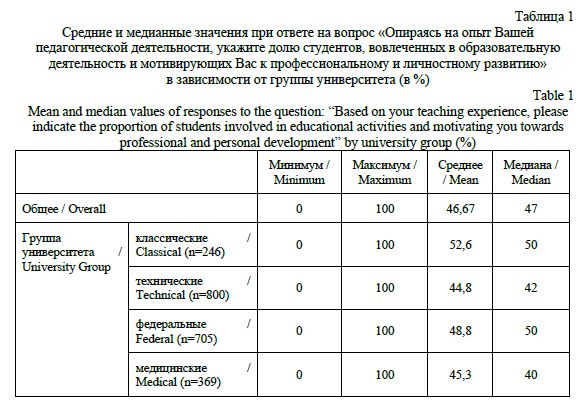
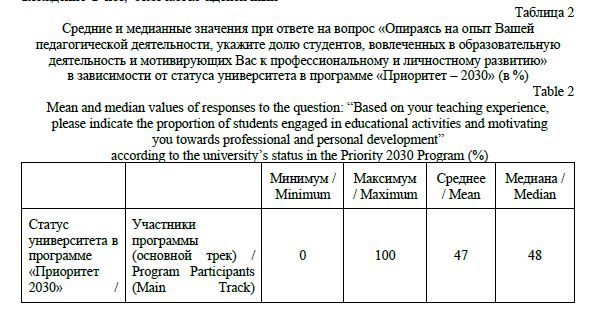

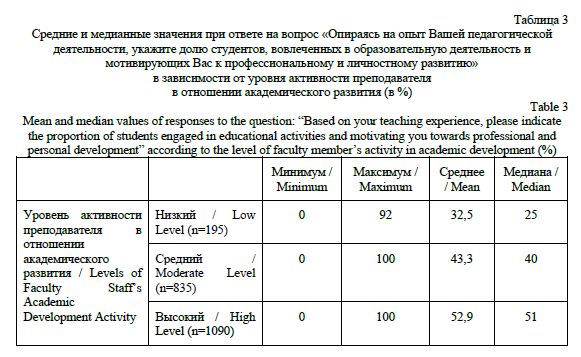
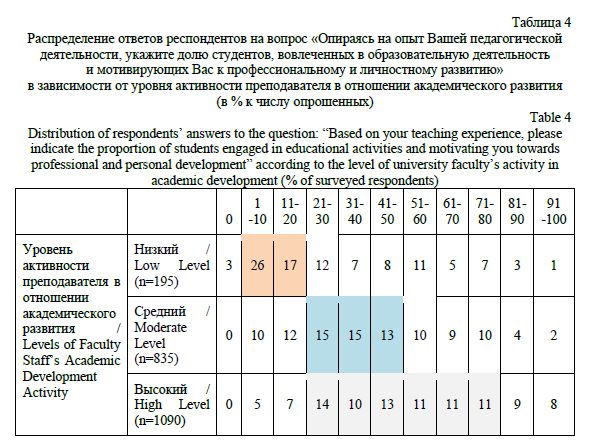
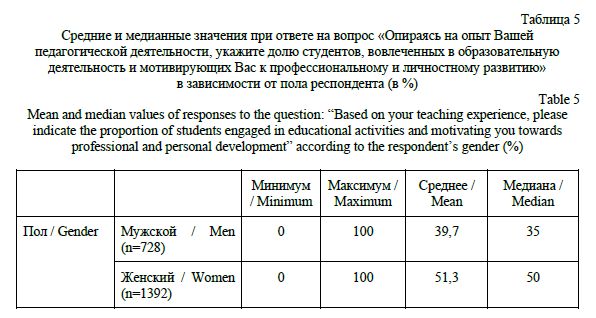
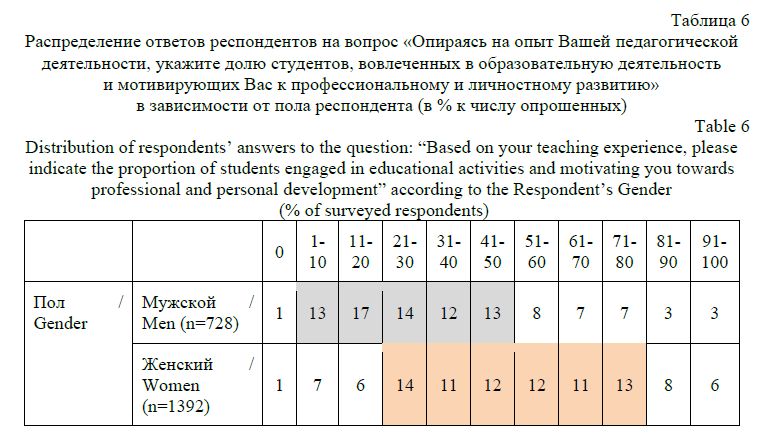
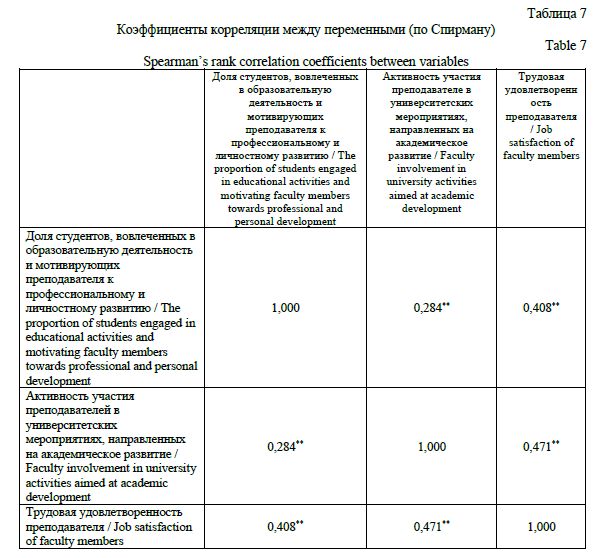
Efimova, G. Z. (2025), “Students as catalysts for academic development of university faculty”, Research Result. Sociology and management, 11 (3), 263-285. DOI: 10.18413/2408-9338-2025-11-3-1-5.


















While nobody left any comments to this publication.
You can be first.
Efimova, G. Z. (2024), “Advantages and disadvantages of working at university: estimates of scientific and pedagogical employees”, Vestnik universiteta, (10), 180-195, DOI: 10.26425/1816-4277-2024-10-180-195, EDN: AAUYVD. (In Russian).
Zborovsky, G., Ambarova, P. (2019), “The Dream of Quality Education: Contradictions in the Development of Educational Communities in Russian Universities”, Mir Rossii, 28 (2), 98-124, DOI: 10.17323/1811-038X-2019-28-2-98-124, EDN: TSIHQC. (In Russian).
Zborovsky, G. E., Ambarova, P. A. (2023), “Mobilizing the Resource Potential of the Scientific and Pedagogical Community in Russian Universities: From Problem to Concept”, Sotsiologichesky zhurnal, 29 (1), 78-96, DOI: 10.19181/socjour.2023.29.1.4, EDN: JKZUTK. (In Russian).
Afrilia, A., Waluyo, U., Apgrianto, K., Soepriyanti, H. (2024), “The Impact of Teacher-Students Relationship on English Students’ Motivation (A Survey on The First Year English Department Students)”, Pendas Jurnal Ilmiah Pendidikan Dasar, 09(2), 2297-2318, DOI: 10.23969/jp.v9i2.13651, EDN: SISZDJ.
Bikowski, D., Broeckelman, M. (2007), “An Educational Framework for Nurturing a Culture of Academic Honesty”, Riding the Wave to Excellence in Engineering Education. 114th Annual Conference of the American Society for Engineering Education, June 24-27, Honolulu, Hawaii, [Online], available at: http://soa.asee.org/paper/conference/paper-view.cfm?id=5376 (Accessed 06 June 2025).
Bovill, C., Felten, P. (2016), “Cultivating student-staff partnerships through research and practice”, International Journal for Academic Development, 21 (1), 103, DOI: 10.1080/1360144X.2016.1124965.
Bovill, C., Felten, P., Cook-Sather, A. (2014), “Engaging Students as Partners in Learning and Teaching (2): Practical guidance for academic staff and academic developers”, International Consortium on Educational Development Conference, Stockholm, Sweden, 16-18 June, 1-6, [Online] http://iced2014.se/proceedings/1146_BovillFeltenCook-Sather%20.pdf (Accessed 20 Fabruary 2025).
Dickerson, C., Jarvis, J., Stockwell, L. (2016), “Staff-student collaboration: student learning from working together to enhance educational practice in higher education”, Teaching In Higher Education, 21 (3), 1-17, DOI: 10.1080/13562517.2015.1136279.
Fei, Y., Tien, L.-Ch. (2024), “The influence of work values and work engagement on improving the work performance of young teachers in universities”, Journal of Law and Sustainable Development, 12 (2), e2585, DOI: 10.55908/sdgs.v12i2.2585, EDN: OYYKWW.
Gill, A., Herbert, G., Mathur, N., Nagpal, V. (2011), “Gender Differences and Factors that Improve Student Educational Satisfaction”, A Study among Indian Commerce Students, 2(5), 27-37.
Healey, M., Flint, A., Harrington, K. (2016), “Students as Partners: Reflections on a Conceptual Model”, Teaching and Learning Inquiry, 4 (2), 8-20. DOI: 10.20343/teachlearninqu.4.2.3.
Healey, M., Flint, A., Harrington, K. (2014), Engagement through partnership: Students as partners in learning and teaching in higher education, HE Academy, York.
Huet, I., Van, Der sluis, H., Woodfield, S. (2017), “The benefits from staff-student partnerships in pedagogical and institutional research: an evaluation research study”, Connecting Higher Education: International perspectives on research-based education; 27-28 Jun 2017, London, U.K.
Juanda, D.A., Rosiana, D. (2024), “Kajian Mengenai Academic Burnout pada Mahasiswa Fakultas Kedokteran”, Bandung Conference Series: Psychology Science, 4(2), 1046-1053, DOI: 10.29313/bcsps.v4i2.12959, EDN: PNCEUA.
Katel, N. (2024), “The Influence of Motivation on Teaching Performance and Student Outcomes”, Solukhumbu Multiple Campus Research Journal, 6(1), 67-74. DOI: 10.3126/smcrj.v6i1.74526. EDN: XFCRFN.
Khamis, H. (2008), “Measures of Association: How to Choose?”, Journal of Diagnostic Medical Sonography, 24 (3), 155-162, DOI: 10.1177/8756479308317006.
Malik, A.S., Nadeem, M., Tariq M. (2022), “The Gender Difference In Students-Teachers Interaction At University Level: A Quantitative Analysis”, Pakistan Journal of Gender Studies, 22(1), 29-50, DOI: 10.46568/pjgs.v22i1.573, EDN: OEBSTO.
McGrade, A. (ed.) (2003), The Cambridge Companion to Medieval Philosophy, Cambridge Companions to Philosophy, Cambridge Univ. Press.
Rahman, Md. H., Bin Amin, M., Yusof, M. F., Islam, Md. A., Afrin, S. (2024), “Influence of teachers’ emotional intelligence on students’ motivation for academic learning: an empirical study on university students of Bangladesh”, Cogent Education, 11 (1). DOI: 10.1080/2331186x.2024.2327752. EDN: FHHSTG.
Riché, P. (1976), Education and Culture in the Barbarian West, Sixth through Eighth Centuries, University of South Carolina Press, Columbia.
Roupas, Z. (2025), “Radical reform is needed to combat power abuses in academia”, Nat Hum Behav, [Online], available at: https://www.nature.com/articles/s41562-025-02127-3 (Accessed 21 Marght 2025).
Sebolao, R. (2023), “Enhancing Academic Development: A reflexive exploration of Staff and Students’ Experiences on curriculum co-creation”, Research in Educational Policy and Management, 5 (3), 165-179, DOI: 10.46303/repam.2023.29, EDN: ZACYKW.
Sarwar, S., Tara, A.N., Abid, M.N., Dukhaykh S. (2025), “Teachers’ Academic Motivation and Student Procrastination Behaviour: Mediating Effects of Emotion Regulation and Study Habits”, BMC Psychology, 13 (1).
Singh, S., Remenyi, D. (2016), “Plagiarism and ghostwriting: The rise in academic misconduct”, South African Journal of Science (Academy of Science of South Africa), 112, 7-7.
Tran, L.H., Moskovsky, C. (2022), “Students as the Source of Demotivation for
Teachers: A Case Study of Vietnamese University
EFL Teachers”, Social Psychology of Education, 25 (6), 1527-1544, DOI: 10.1007/s11218-022-09732-4, EDN: KYQRMQ.
P.A. Ambarova, Professor at Ural Federal University, for critical comments and constructive recommendations that made it possible to improve the text of the publication; anonymous reviewers; university faculty of Russian universities who participated in the questionnaire survey.